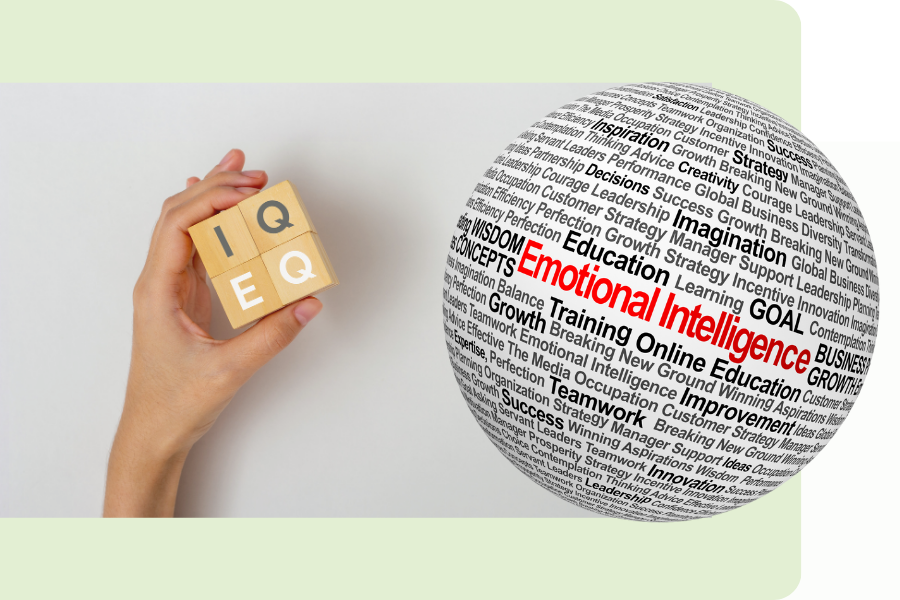
Last issue we introduced new contributor, Jade Bodzasy, Founder of Emotional Intelligence Consulting Inc. Her first article introduced us to two of the three pillars of Emotional Intelligence: Self-Awareness and Self-Management.
Today she discusses the third and fourth pillars of EI and their application to patients and how practice owners and their staff can further develop EI skills.
Social awareness is the third pillar of emotional intelligence.
It involves the ability to understand and empathize with the emotions, perspectives, and needs of others. In the eyecare field, social awareness is crucial for building strong relationships with patients and understanding their unique circumstances. Eyecare professionals with high social awareness can pick up on subtle emotional cues, listen actively, and respond with empathy.
Remember, Empathy is the ability to sense other people’s emotions and the skill to imagine what someone else might be thinking or feeling without placing your own experiences, biases, or opinions on what they are going through.
It is all about THEM!
Empathetic listening is a key skill in social awareness. By truly understanding how a patient feels about their state of eye health, eyecare professionals can gain a deeper knowledge of their concerns, fears, and needs.
This requires active engagement, non-verbal cues, and open-ended questions that encourage patients to share their experiences. When eyecare professionals demonstrate empathy and understanding, patients feel heard and valued, leading to greater trust and patients that are invested in your clinic.
Patients will commit to you, because you have a clear interest in their well-being beyond the clinical aspects of their care.
With Social Awareness in your toolbox you can start on the final pillar: Relationship management
Relationship management involves effectively managing interpersonal interactions and building positive relationships. In eyecare, strong relationships between you and patients are essential for successful treatment outcomes. By employing relationship management skills, you can foster trust, collaboration, and open communication with patients.
 One important aspect of relationship management is the ability to create a feeling of comfort within your patients. When you can make a patient feel comfortable they will offer more information to you so that you can provide them with the best options for their care plan. We have to be diligent with reading the cues and listening to what patients are telling us in order to master our relationships with them.
One important aspect of relationship management is the ability to create a feeling of comfort within your patients. When you can make a patient feel comfortable they will offer more information to you so that you can provide them with the best options for their care plan. We have to be diligent with reading the cues and listening to what patients are telling us in order to master our relationships with them.
Not everyone enters the clinic ready to manage their relationship with their eyecare professionals. Some have had a very difficult day and this is the last thing they want to be doing. By taking on the responsibility of the relationship between yourself and the patient, you increase the odds that they will have an amazing experience during their appointment.
How can I further my development of Emotional Intelligence?
Developing emotional intelligence is an ongoing process that requires self-reflection, practice, and continuous learning. Seek out support to develop emotional intelligence in yourself and professionals through training and education programs that Emotional Intelligence Consulting Inc has. These programs are designed specifically for eyecare professionals with the knowledge and skills necessary to enhance their self-awareness, self-management, social awareness, and relationship management skills.
 To improve self-awareness and self-management, you can engage in reflective practices such as journaling, awareness exercises, and self-assessment tools on your own. These activities help them become more aware of your own emotions, triggers, and biases, allowing you to regulate your emotions effectively. Additionally, seeking feedback from an EI professional will give you valuable insights into areas for growth and improvement.
To improve self-awareness and self-management, you can engage in reflective practices such as journaling, awareness exercises, and self-assessment tools on your own. These activities help them become more aware of your own emotions, triggers, and biases, allowing you to regulate your emotions effectively. Additionally, seeking feedback from an EI professional will give you valuable insights into areas for growth and improvement.
Promoting social awareness and relationship management skills can be achieved through role-playing exercises, communication workshops, and team-building activities which are all great options for a productive team meeting. These activities allow you to practice active listening, empathy, and conflict resolution in a safe and supportive environment. By honing these skills, you can build strong relationships with patients and collaborate effectively as part of an Eyecare team.
Take this with you
Emotional intelligence is a powerful tool for eyecare professionals in managing patient experiences and building strong patient relationships. By developing self-awareness, self-management, social awareness, and relationship management skills, you can navigate emotionally-charged situations with empathy and understanding. This leads to enhanced patient satisfaction, improved patient outcomes, and a more positive eyecare experience overall. By investing in the development of emotional intelligence, eye care clinics can create a culture of compassion and empathy, benefiting both patients and eyecare professionals alike.
It’s never too late to start learning, just take it one step at a time.
If you missed Jade’s prior article on EI, click here to view.
Look for Jade’s continuing series on how Emotional Intelligence can be applied in your practice setting. Learn More about Jade’s consulting service by visiting her website.

Jade Bodzasy
Jade Bodzasy, Founder of Emotional Intelligence Consulting Inc., is a dedicated Coach and Consultant for Optometric Practices. Her extensive background includes over 20,000 hours of expertise focused on customer relations, work structure refinement, training method development, and fostering improved work culture within Optometric practices.
Certified in Rational Emotive Behavior Techniques (REBT), Jade possesses a unique skillset that empowers individuals to gain profound insights into the origins of their behaviors, as well as those of others. Leveraging her certification, she equips optometry practices with invaluable resources and expert guidance to establish and sustain a positive, healthful, and productive work environment.









